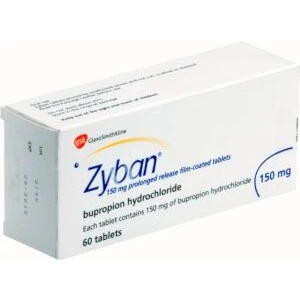How Long Does it Take for Zyban to Work?
If you’re thinking about quitting smoking, you’ll probably be exploring your options when it comes to effective treatments. Zyban is one such medication, providing reliable relief from cravings and withdrawal symptoms. But just how successful can it be, and how long does it take for Zyban to work?
In this guide, we explore how Zyban can help you quit smoking, how long before you’ll notice its effects, and how effective it is. If Zyban isn’t the right medication for you, we’ll also discuss some of the alternative options available. Are you ready to take the first step to a smoke-free lifestyle? Let’s get started.
How Does Zyban Help You Quit Smoking?
Zyban was originally intended to treat depression; however, it was found that its active ingredient (bupropion) also reduced nicotine withdrawal symptoms. It does this by lowering the intensity of nicotine cravings and withdrawals by acting on key messengers called dopamine and noradrenaline, preventing their reuptake.
Dopamine is involved in the body’s reward and pleasure pathways. So, when you smoke, dopamine levels increase, giving you a sense of reward. At the same time, adrenaline is released, creating a ‘kick’ and raising your blood pressure and heart rate. By acting on these pathways, particularly by inhibiting the reuptake of dopamine, Zyban makes cigarette withdrawal easier to manage.
How Long Does it Take for Zyban to Work?
Most people start to notice small changes in their smoking behaviour within the first two weeks of taking Zyban, like reduced cravings or fewer cigarettes smoked. In clinical trials, individuals often set a target quit date in the first or second week, with the effects of the treatment building from there.
It takes approximately 8 days for bupropion to reach a steady state in the body. That is the point at which the amount of medication you take is balanced by the amount being eliminated from the body. However, it can take several weeks for the full benefits of Zyban for smoking cessation to be fully apparent.

How Long Do You Take Zyban For?
Zyban treatment generally lasts for 9 weeks. Before you begin, you should set a target quit date, ideally during your second week of taking the medication. This means you should still be smoking when you first start using the tablets.
The Zyban dosage schedule is as follows:
| Days | Dosage | Direction |
|---|---|---|
| 1-6 | One tablet, once per day | Take with or without food, but avoid taking it before bedtime, as it may disrupt sleep. |
| 7-13 | One tablet, twice per day | Leave 8 hours in between doses. Do not take just before bed. |
| 14-20 | One tablet, twice per day | Stop smoking on your target quit date |
| 3 to 9 | One tablet, twice per day | Continue for up to 9 weeks |
If you’ve successfully quit smoking by week 7, your clinician may advise you to gradually cut down and stop your Zyban treatment between weeks 7 and 9. They will guide you on how to do this safely.
If you have not successfully quit smoking by week 7 of Zyban treatment, your clinician will advise you to stop taking it because it is unlikely to work for you. They may suggest alternative quit-smoking aids and medications for you to try. However, Zyban alone will not help you quit smoking; you must be motivated to do so, and you will need ongoing support to help you give up. Your clinician may recommend using Zyban as part of a wider stop smoking programme.

Please note that some individuals may need to remain on a single 150 mg tablet per day throughout their treatment schedule, rather than increasing the dosage as usual. These include individuals:
- Over the age of 65
- With kidney or liver disease
- Who have a higher risk of seizures or fits
How Effective is Zyban?
Clinical trial data and meta-analyses consistently show that bupropion, the active ingredient in Zyban, can help 1 in 5 smokers quit and remain non-smoking after one year. A Cochrane review found that bupropion increases the success rate of quitting smoking by 52% to 77%. That means that 5 to 7 more people in every 100 will give up smoking using Zyban.
Research from a further clinical trial shows that bupropion is associated with increased quit rates compared to a placebo (64% vs 57%) at the end of the medication course. This trend continued for three months, but not after six months and a year. After one year, the results showed that 22% of people in the bupropion group and 28% in the placebo group had quit smoking.
Zyban
- Suppresses cravings & withdrawal symptoms
- Nicotine-free
- May improve mood during quitting
What if Zyban Isn’t Right for Me?
While Zyban is an effective stop-smoking aid, it may not be right for everyone, and an alternative could be necessary. If this is the case, our clinicians will be available to discuss your options and help you make an informed decision.
At Prescription Doctor, we have a range of smoking cessation treatments to get you on the path to becoming smoke-free. These are:
- Cytisine: Cytisine is a prescription-only medication that contains a natural plant extract that binds to the nicotine receptors in the brain, blocking the effects of nicotine and making smoking less rewarding. After one month, 40% of people taking cytisine continuously abstained from smoking compared to 31% of people given a placebo.
- Varenicline: A prescription-only pill that contains the active ingredient varenicline and was formerly available under the brand name Champix. It is taken daily for 12 weeks and binds to nicotine receptors in the brain to reduce smoking withdrawal symptoms and cravings. Varenicline can help more than 44% of people quit smoking within 4 weeks.
Reliable Stop-Smoking Support From Prescription Doctor
Think you’re ready to kick the smoking habit for good? The good news is you don’t need to do it alone, as Prescription Doctor will be ready to support you throughout the entire process.
From answering common questions such as ‘how long does it take for Zyban to work?’ to discussing the impact quitting has on your body, we offer a wealth of useful information at your fingertips. We can even help if you only consider yourself to be a social smoker, but are still thinking about stopping.
Our stop-smoking service is tailored to meet your needs. Simply complete a short medical questionnaire and our team of specialist clinicians will assess which treatment is best for your circumstances. They will also regularly check in with you to monitor progress and are available to answer any questions you may have.
Want your medication quickly and discreetly? No problem. All orders approved before 3pm on a weekday are eligible for next-day delivery from our General Pharmaceutical Council-registered dispensing pharmacy, shipped in plain packaging. It’s our mission to take the hassle out of healthcare.
Ready to begin your stop-smoking journey with Zyban? Register for your consultation today.
Sources
Cochrane Library (2020): Antidepressants for smoking cessation.
EMC (2023): CHAMPIX 0.5 mg and CHAMPIX 1.0 mg film-coated tablets (Initiation Pack).
JAMA (2004): Bupropion for Smoking Cessation: A Randomized Trial.
National Library of Medicine (2024): Bupropion.
NEJM (2014): Cytisine versus nicotine for smoking cessation.
PubMed (2004): A Review of the Neuropharmacology of Bupropion, a Dual Norepinephrine and Dopamine Reuptake Inhibitor.
PubMed (2008): The use of bupropion SR in cigarette smoking cessation.
Authored By

Leanne Edermaniger
Medical Content WriterPublished on: 23/11/2023 Re-Published on: 03/10/2025
Reviewed By

Mohamed Imran Lakhi
MPharm - Lead PharmacistReviewed on: 03/10/2025
© 2013 - 2026 Al Muhsineen Limited. All Rights Reserved. Registered Pharmacy: 34 Halliwell Road, Bolton BL1 8RL. Registered Office: 254 First Floor, Shearbrow, Blackburn, England, BB1 8DS







